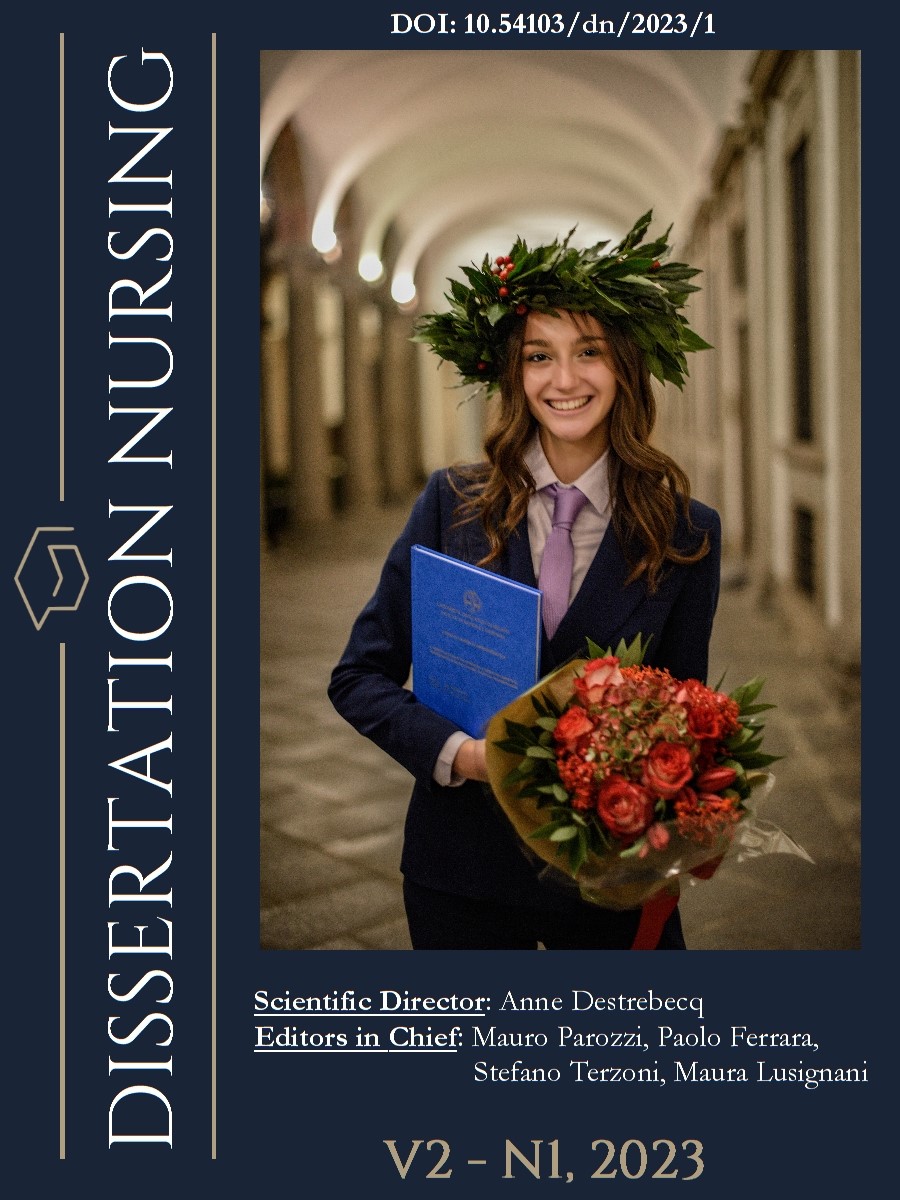The Italian version of the Care Recipient Behavior Assessment Scale (Careba): validation in Italian on patients with dementia
DOI:
https://doi.org/10.54103/dn/18991Keywords:
Dementia, aggressive behaviour, aggressiveness, nurse, assessmentAbstract
INTRODUCTION:
The international literature shows that 20-40% of patients with cognitive impairment, hospitalized in long-term facilities, may react during nursing care with aggressive behaviors such as screaming, threats, kicks, punches and scratches. The objective of this study is to validate in Italian the "Care Recipient Behavior Assessment Scale" (CAREBA), an assessment tool designed to measure physical and verbal aggression of the person with dementia.
METHODS:
The CAREBA was back-translated through an observational study. It was administered to a sample of dementia patients with physical and/or verbal aggressive behaviors, conducted in a hospital in Northern Italy . Reliability and validity were assessed.
RESULTS:
The scale shows satisfactory internal consistency (Cronbach's Alpha = 0.79) and content validity (CVI-S= 90%).
CONCLUSIONS:
The CAREBA scale is a valid and reliable tool to detect aggression in patients with dementia.
Downloads
References
Savva GM, Zaccai J, Matthews FE, Davidson JE, McKeith I, Brayne C, et al. Prevalence, correlates and course of behavioural and psychological symptoms of dementia in the population. Br J Psychiatry. 2009 Mar 1;194(3):212–9.
Geda YE, Schneider LS, Gitlin LN, Miller DS, Smith GS, Bell J, et al. Neuropsychiatric symptoms in Alzheimer’s disease: Past progress and anticipation of the future. Alzheimers Dement. 2013 Sep;9(5):602–8.
Ismail Z, Smith EE, Geda Y, Sultzer D, Brodaty H, Smith G, et al. Neuropsychiatric symptoms as early manifestations of emergent dementia: Provisional diagnostic criteria for mild behavioral impairment. Alzheimers Dement. 2016 Feb;12(2):195–202.
Desai AK, Schwartz L, Grossberg GT. Behavioral Disturbance in Dementia. Curr Psychiatry Rep. 2012 Aug;14(4):298–309.
Skovdahl K, Kihlgren AL, Kihlgren M. Dementia and aggressiveness: stimulated recall interviews with caregivers after video-recorded interactions. J Clin Nurs. 2004 May;13(4):515–25.
Cheng S-T. Dementia Caregiver Burden: a Research Update and Critical Analysis. Curr Psychiatry Rep [Internet]. 2017 Sep [cited 2017 Oct 29];19(9). Available from: http://link.springer.com/10.1007/s11920-017-0818-2
Rasin, Joyce PhD, RN; Barrick, Ann Louise PhD. Bathing Patients with Dementia: Concentrating on the patient’s needs rather than merely the task. 2014 Mar;AJN, American Journal of Nursing March 2004-Volume 104-Issue 3-pp 30-32.
Hoeffer B, Talerico KA, Rasin J, Mitchell CM, Stewart BJ, McKenzie D, et al. Assisting cognitively impaired nursing home residents with bathing: effects of two bathing interventions on caregiving. The Gerontologist. 2006 Aug;46(4):524–32.
Boustani M, Zimmerman S, Williams CS, Gruber-Baldini AL, Watson L, Reed PS, et al. Characteristics associated with behavioral symptoms related to dementia in long-term care residents. The Gerontologist. 2005 Oct;45 Spec No 1(1):56–61.
Brodaty H, Arasaratnam C. Meta-analysis of nonpharmacological interventions for neuropsychiatric symptoms of dementia. Am J Psychiatry. 2012 Sep;169(9):946–53.
Sloane PD, Hoeffer B, Mitchell CM, McKenzie DA, Barrick AL, Rader J, et al. Effect of person-centered showering and the towel bath on bathing-associated aggression, agitation, and discomfort in nursing home residents with dementia: a randomized, controlled trial. J Am Geriatr Soc. 2004 Nov;52(11):1795–804.
Cabrera E, Sutcliffe C, Verbeek H, Saks K, Soto-Martin M, Meyer G, et al. Non-pharmacological interventions as a best practice strategy in people with dementia living in nursing homes. A systematic review. Eur Geriatr Med. 2015 Apr;6(2):134–50.
Cammisuli DM, Danti S, Bosinelli F, Cipriani G. Non-pharmacological interventions for people with Alzheimer’s Disease: A critical review of the scientific literature from the last ten years. Eur Geriatr Med. 2016 Feb;7(1):57–64.
Mann E, Köpke S, Haastert B, Pitkälä K, Meyer G. Psychotropic medication use among nursing home residents in Austria: a cross-sectional study. BMC Geriatr [Internet]. 2009 Dec [cited 2017 Oct 29];9(1). Available from: http://bmcgeriatr.biomedcentral.com/articles/10.1186/1471-2318-9-18
Schneider LS, Tariot PN, Dagerman KS, Davis SM, Hsiao JK, Ismail MS, et al. Effectiveness of Atypical Antipsychotic Drugs in Patients with Alzheimer’s Disease. N Engl J Med. 2006 Oct 12;355(15):1525–38.
Richter T, Mann E, Meyer G, Haastert B, Köpke S. Prevalence of psychotropic medication use among German and Austrian nursing home residents: a comparison of 3 cohorts. J Am Med Dir Assoc. 2012 Feb;13(2):187.e7-187.e13.
Alexopoulos GS, Streim J, Carpenter D, Docherty JP, Expert Consensus Panel for Using Antipsychotic Drugs in Older Patients. Using antipsychotic agents in older patients. J Clin Psychiatry. 2004;65 Suppl 2:5-99; discussion 100-102; quiz 103-104.
Daiello LA. Atypical antipsychotics for the treatment of dementia-related behaviors: an update. Med Health R I. 2007 Jun;90(6):191–4.
Howard R, McShane R, Lindesay J, Ritchie C, Baldwin A, Barber R, et al. Donepezil and Memantine for Moderate-to-Severe Alzheimer’s Disease. N Engl J Med. 2012 Mar 8;366(10):893–903.
Brauer R, Smeeth L, Anaya-Izquierdo K, Timmis A, Denaxas SC, Farrington CP, et al. Antipsychotic drugs and risks of myocardial infarction: a self-controlled case series study. Eur Heart J. 2015 Apr 21;36(16):984–92.
Hartikainen S, Lönnroos E, Louhivuori K. Medication as a risk factor for falls: critical systematic review. J Gerontol A Biol Sci Med Sci. 2007 Oct;62(10):1172–81.
Bierman EJM, Comijs HC, Gundy CM, Sonnenberg C, Jonker C, Beekman ATF. The effect of chronic benzodiazepine use on cognitive functioning in older persons: good, bad or indifferent? Int J Geriatr Psychiatry. 2007 Dec;22(12):1194–200.
Ballard C, Creese B, Corbett A, Aarsland D. Atypical antipsychotics for the treatment of behavioral and psychological symptoms in dementia, with a particular focus on longer term outcomes and mortality. Expert Opin Drug Saf. 2011 Jan;10(1):35–43.
Kales HC, Kim HM, Zivin K, Valenstein M, Seyfried LS, Chiang C, et al. Risk of mortality among individual antipsychotics in patients with dementia. Am J Psychiatry. 2012 Jan;169(1):71–9.
Nielsen R-E, Lolk A, M Rodrigo-Domingo null, Valentin J-B, Andersen K. Antipsychotic treatment effects on cardiovascular, cancer, infection, and intentional self-harm as cause of death in patients with Alzheimer’s dementia. Eur Psychiatry J Assoc Eur Psychiatr. 2017 May;42:14–23.
Maher AR, Maglione M, Bagley S, Suttorp M, Hu J-H, Ewing B, et al. Efficacy and Comparative Effectiveness of Atypical Antipsychotic Medications for Off-Label Uses in Adults: A Systematic Review and Meta-analysis. JAMA. 2011 Sep 28;306(12):1359.
Viggo Hansen N, Jørgensen T, Ørtenblad L. Massage and touch for dementia. Cochrane Database Syst Rev. 2006 Oct 18;(4):CD004989.
Holmes C, Hopkins V, Hensford C, MacLaughlin V, Wilkinson D, Rosenvinge H. Lavender oil as a treatment for agitated behaviour in severe dementia: a placebo controlled study. Int J Geriatr Psychiatry. 2002 Apr;17(4):305–8.
Fu C-Y, Moyle W, Cooke M. A randomised controlled trial of the use of aromatherapy and hand massage to reduce disruptive behaviour in people with dementia. BMC Complement Altern Med [Internet]. 2013 Dec [cited 2017 Oct 29];13(1). Available from: http://bmccomplementalternmed.biomedcentral.com/articles/10.1186/1472-6882-13-165
Hsu MH, Flowerdew R, Parker M, Fachner J, Odell-Miller H. Individual music therapy for managing neuropsychiatric symptoms for people with dementia and their carers: a cluster randomised controlled feasibility study. BMC Geriatr. 2015 Jul 18;15:84.
Norman G, Streiner D (2015) Biostatistica – quello che avreste voluto sapere. Casa Editrice Ambrosiana, Milano
Polit, D.F., Beck, C.T., Owen, SV. (2007). Is the CVI an acceptable indicator of content validity? Appraisal and recommendations. Res Nurs Health, 30(4):459–467.
Downloads
Published
How to Cite
Issue
Section
License
Copyright (c) 2023 Giada Cocciolo

This work is licensed under a Creative Commons Attribution-NonCommercial-NoDerivatives 4.0 International License.
Accepted 2022-12-16
Published 2023-01-30















